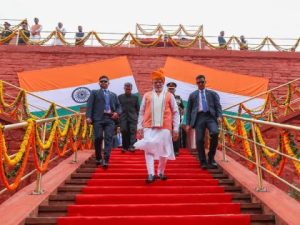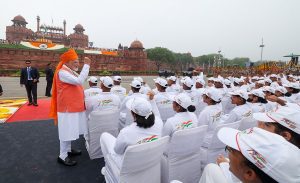New Delhi – Delhi Police Commissioner SBK Singh has established comprehensive new objectives for the force, drawing inspiration from Prime Minister Narendra Modi’s Red Fort address on Independence Day. These ambitious targets represent a significant shift toward modernization and enhanced operational efficiency within the capital’s law enforcement framework.
The announcement comes as Singh acknowledged both achievements and shortcomings within the current Delhi Police structure, particularly highlighting the gap between hard work and public trust that needs urgent attention.
Independence Day Security Success and Self-Reflection

Commissioner Singh began by congratulating Delhi Police officers and staff for their exemplary performance in ensuring completely incident-free security arrangements during Independence Day celebrations. Despite this success, he candidly acknowledged systemic challenges that require immediate addressing.
“Despite working so hard, even beyond working hours, we have not been able to win the trust of the public in the form that we should have done,” Singh stated, demonstrating remarkable transparency about current Delhi Police performance gaps. This honest assessment sets the foundation for the comprehensive reforms he has outlined.
The commissioner’s acknowledgment reflects a mature understanding that operational success alone cannot guarantee public confidence, emphasizing the need for broader institutional changes within Delhi Police operations.
Three-Pillar Strategy for Organizational Transformation


Self-Reliance Initiative
The first major target involves achieving greater independence from external agencies. Singh has directed Delhi Police units to submit detailed proposals within fifteen days focusing on reducing dependence on other organizations for specialized resources. These critical resources include commandos, bomb disposal squads, and wireless communication systems.
This self-reliance initiative aims to create a more autonomous and responsive Delhi Police force capable of handling complex security challenges without external dependencies. The fifteen-day deadline demonstrates the urgency Singh places on this transformation.
Technology Integration and Modernization
The second pillar focuses on advancing technological capabilities across all Delhi Police operations. Singh emphasized that the force must “go further” in several critical areas including surveillance systems, cybercrime prevention mechanisms, anti-drone defense capabilities, and counter-terrorism operations.
Technology units have received specific instructions to form specialized committees and submit comprehensive recommendations within one month. This timeline reflects the commissioner’s commitment to rapid technological advancement while ensuring thorough planning and implementation strategies.
The technology focus addresses modern policing challenges that require sophisticated solutions, positioning the force to handle contemporary threats more effectively.
Healthy Competition Culture
The third strategic focus involves cultivating healthy competition within the organization while eliminating counterproductive jealousy at both individual and organizational levels. Singh stressed the importance of creating an environment where excellence is rewarded and collaboration is encouraged.
This cultural transformation aims to improve overall performance standards while maintaining team cohesion and professional relationships throughout all levels of the organization.
Recognition of Outstanding Service


Alongside announcing new targets, Singh celebrated the achievements of eighteen personnel who received police medals for distinguished and meritorious service on Independence Day. This recognition demonstrates the commissioner’s balanced approach to acknowledging existing excellence while pushing for broader improvements.
Also Read: Delhi Govt. Schools Water Logging Crisis Forces 14,000 Students Online
The medal recipients represent the standards Singh wants to see replicated across the entire force, serving as role models for professional excellence and dedication to public service.
Accountability Measures and Disciplinary Actions
![]()
![]()
The commitment to enhanced standards became evident through Singh’s decisive action during a surprise inspection at an ISKCON temple in Shahbad Dairy. While reviewing Janmashtami security arrangements, he discovered that officers assigned to Gate No. 2 were absent from their posts.
This discovery resulted in immediate suspension of eight personnel, ranging from constables to inspector-rank officers. The swift action demonstrates Singh’s zero-tolerance approach to dereliction of duty and his commitment to maintaining high operational standards.
A departmental inquiry has been initiated to determine if additional personnel were absent, showing thorough investigation procedures and comprehensive accountability measures.
Strategic Timeline and Implementation Framework
The commissioner has established clear timelines for achieving these objectives. Units have fifteen days to submit self-reliance proposals, while technology committees have one month to present their recommendations. These specific deadlines create accountability and ensure rapid progress toward established goals.
The structured approach reflects professional project management principles applied to law enforcement reform, ensuring measurable progress and clear benchmarks for success.
Future Implications for Public Safety
These comprehensive reforms promise significant improvements in public safety and community relations. By addressing self-reliance, technology integration, and organizational culture simultaneously, Singh is creating a foundation for sustained improvement in police effectiveness.
The emphasis on public trust recognition shows understanding that successful policing requires community confidence and support. These reforms aim to bridge the gap between operational capability and public perception through tangible improvements in service delivery.
The combination of immediate accountability measures with long-term strategic planning demonstrates Singh’s comprehensive approach to police reform, potentially serving as a model for law enforcement modernization efforts nationwide.
This multi-faceted strategy positions the Delhi police force for enhanced effectiveness in addressing contemporary security challenges while building stronger community relationships.

